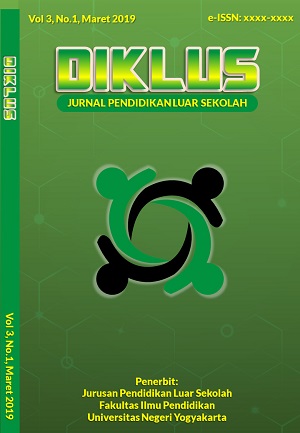Resiliensi Keluarga Terdampak Pasca Penutupan Lokalisasi di Indonesia: Tinjauan Systematic Literature Review
DOI:
https://doi.org/10.21831/diklus.v9i1.89311Abstract
Penutupan lokalisasi di Indonesia bertujuan memberantas prostitusi dan meningkatkan kesejahteraan sosial, namun menimbulkan dampak sosial, ekonomi, dan psikologis bagi keluarga terdampak. Penelitian ini bertujuan menganalisis resiliensi keluarga pasca-penutupan lokalisasi melalui pendekatan systematic literature review (SLR). Data diperoleh dari 30 artikel ilmiah terbitan 2010–2024 dengan kata kunci “resiliensi keluarga”, “penutupan lokalisasi”, “pekerja seks komersial”, dan “sosial ekonomi”. Hasil menunjukkan bahwa keluarga terdampak menghadapi tantangan kehilangan pekerjaan, stigma sosial, dan tekanan psikologis, tetapi tetap menunjukkan resiliensi dalam tiga aspek utama: (1) ekonomi, dengan diversifikasi pekerjaan dan pemanfaatan bantuan pemerintah/LSM; (2) sosial, dengan membangun kembali relasi masyarakat dan mengurangi stigma; serta (3) psikologis, dengan memperkuat identitas baru, spiritualitas, dan optimisme. Temuan ini menekankan pentingnya kebijakan yang inklusif, berkelanjutan, dan berbasis kebutuhan lokal untuk mendukung kesejahteraan keluarga terdampak.
Kata Kunci: resiliensi keluarga, lokalisasi, pemberdayaan
Family Resilience After the Closure of Localizations in Indonesia: A Systematic Literature Review
Abstract
The closure of prostitution localizations in Indonesia was intended to eradicate prostitution and improve social welfare; however, it has brought significant social, economic, and psychological impacts on affected families. This study aims to analyze family resilience in the aftermath of localization closures through a Systematic Literature Review (SLR) approach. Data were obtained from 30 scholarly articles published between 2010 and 2024 using the keywords “family resilience,” “localization closure,” “commercial sex workers,” and “socioeconomic.” The findings reveal that affected families face challenges such as job loss, social stigma, and psychological distress, yet they continue to demonstrate resilience in three key aspects: (1) economic, through job diversification and the utilization of government/NGO assistance; (2) social, by rebuilding community relations and reducing stigma; and (3) psychological, by strengthening new identities, spirituality, and optimism. These findings highlight the importance of inclusive, sustainable, and locally grounded policies to support the well-being of affected families.
Keywords: family resilience, localization, empowerment
Downloads
Published
How to Cite
Issue
Section
Citation Check
License
Copyright (c) 2025 Rezka Arina Rahma, Ach Rasyad, Sri Wahyuni

This work is licensed under a Creative Commons Attribution-ShareAlike 4.0 International License.
Diklus: Jurnal Pendidikan Luar Sekolah allows readers to read, download, copy, distribute, print, search, or link to its articles' full texts and allows readers to use them for any other lawful purpose. Authors submitting a manuscript do so on the understanding that if accepted for publication, the copyright of the article shall be assigned to Diklus: Jurnal Pendidikan Luar Sekolah
 | Diklus: Jurnal Pendidikan Luar Sekolah is licensed under a Creative Commons Attribution-ShareAlike 4.0 International License. |













